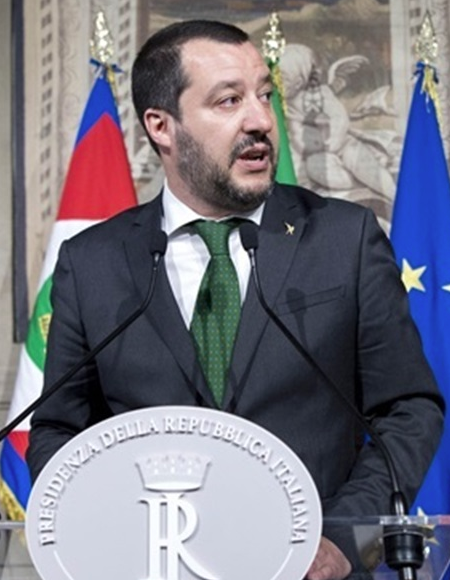
(Photo By Presidenza della Repubblica, Attribution)
ROME — He skipped a Cabinet meeting to attend a horse race and took a dip in a Tuscan villa’s swimming pool to show he didn’t fear the Mafia. He leads the junior party in Italy’s populist coalition government, but he acts like he’s the one running the country.
Five weeks after taking national office, Interior Minister Matteo Salvini, who heads the right-wing League party, is outshining his coalition rival and fellow deputy premier, Luigi Di Maio, whose 5-Star Movement is the Italian Parliament’s biggest party.
Opinion polls indicate that Salvini’s anti-migrant, anti-European Union party has soared in popularity since it placed third in Italy’s March 4 election. Recent surveys of eligible voters put the League neck-and-neck or even a couple percentage points ahead of the 5-Star Movement.
During the short time the 45-year-old Salvini has occupied his first Cabinet post, he grabbed international headlines with his “Italians come first” politics, ordering Italy’s ports closed to private rescue ships and thereby keeping hundreds of migrants stranded at sea.
He also has alarmed European Union leaders by pledging to make a European Parliament election next year a referendum on the legislature he served in for 14 years, and firing up the League’s rank-and-file with slogans like “We’ll knock down the wall in Brussels.”
“He understands very well what the public is expecting from him,” analyst Wolfango Piccoli, co-president of London-based Teneo Intelligence, said. “They want to see a change.”
Salvini’s brash, populist style is an undeniable novelty in Italian politics, and he seems to be relishing his role as a maverick from some of his recent actions.
— At the U.S. ambassador’s Fourth of July party in Rome, an annual to-be-seen-at event for international VIPs, a tieless Salvini chowed down on a burger smothered in red onions while gripping the bun in his hands. Other guests daintily tackled their grilled meats with fork-and-knife as Italian table etiquette demands.
— As Italy’s prime minister and Cabinet discussed Di Maio’s first main accomplishment as labour minister, a decree clamping down on “gig’ economy short-term contracts, Salvini was a couple hundred kilometres (150 miles) away in Siena for the running of the Palio, the wild and popular medieval horse race.
— The next day, to hammer home that he would be hard on organized crime, Salvini toured a villa in Tuscany that Italian prosecutors had seized from a Cosa Nostra boss, changed into bathing trunks and dove into the villa’s chilly swimming pool while journalists watched and cameras rolled.
“The last (Italian) politician I can remember doing that is Benito Mussolini,” Teneo’s Piccoli ventured, referring to the Fascist dictator who liked to show off his physical fitness.
Salvini seems to be permanently campaigning for the League, which he has transformed from a regional party in Italy’s affluent north to a national force.
The League is serving in its fourth government, the first three when it was called the Northern League; the 5-Stars are novices to national government.
After no party emerged from the March election with an absolute majority in Parliament, DiMaio and Salvini cut a deal that required both to sideline their ambition to be premier. They opted for compromise pick Giuseppe Conte, a lawyer with 5-Star sympathies and no public offices on his resume.
Conte has made relatively few public appearances since he was sworn in, a departure from his predecessors. Salvini has occupied much of the vacuum.
Analyst Piccolo thinks Di Maio made a “not particularly smart” decision by choosing a Cabinet portfolio with responsibility for a “politically divisive and toxic” issue like labour, enabling his populist partner-rival to eclipse him.
Indeed, Di Maio’s move to limit temporary work contracts angered many business owners who want flexibility to compete in global markets.
Salvini’s base includes such businesses, and he promised to “improve” Di Maio’s decree when Parliament debates converting it into law.
Di Maio retorted that 5-Star lawmakers would be a “dam” against any watering down of his labour decree.
A cartoon on the front page of Italy’s national Corriere della Sera newspaper depicted the labour minister, who has championed better work conditions for delivery persons on bicycles, bringing lunch to Salvini’s house on a bike.
An opinion survey published in late June indicated the League has shot up from its 17.4 per cent support showing in the election to 31.2 per cent among eligible voters. Support for the 5-Stars, who received 32.7 of the election vote, dipped to 29.8 per cent among those surveyed.
“It’s difficult to hide that there are cracks” in the coalition, political analyst Massimo Franco wrote in Corriere della Sera. “They exist, and they are destined to multiply.”
The League has a decades-old reputation for capably administering cities and towns in the north. Salvini spent most of his first weeks in office on the campaign trail for local League candidates in mayoral races.
Di Maio, 32, leads a Movement whose most visible political accomplishment before entering national government in June was winning the mayor’s office in Rome two years ago. During Mayor Virginia Raggi’s tenure at City Hall, the Italian capital has endured an ailing mass transit system and pileups of uncollected trash.
The League scored big in the recent local balloting. The 5-Stars suffered setbacks in several races.